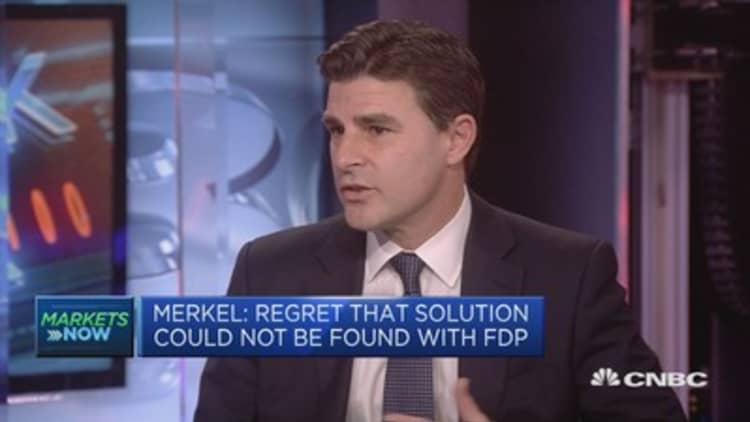The euro was under some pressure Monday following news that talks to form a new government in Germany had collapsed.
Market players, however, were somewhat relaxed over the ongoing political instability in Berlin, despite this being the first time since World War II that a general election had not led to a new government.
Kit Juckes, global head of FX strategy at Societe Generale, described the pressure on the euro as "not a dramatic reaction."
In fact, the currency began retracting some of the earlier losses in mid-morning trade in Europe and the German stock exchange was modestly lower, down by 0.2 percent.
"Germany's strong and improving fundamentals provide some important insulation from political concerns. In other words, the ship can effectively sail itself," Rabobank said in a note Monday.
Data released last week showed the German economy beating analysts' forecasts with a 0.8 percent growth in the third quarter of the year. At the same time, confidence levels among German businesses hit an all-time high in October and the unemployment rate remained at an historic low, Deutsche Welle reported.

"One could conceive of a scenario where a considerably protracted period of political uncertainty weighs upon German demand and, thus, begins to act as a drag on growth in the region more broadly," Rabobank said in the same note. However, he added: "This is certainly not a near-term risk and nor is it one that should make itself felt within a tradable time horizon."
Thus, despite the uncertainty as to who will govern the largest European economy, investors remain confident on Germany's economic performance and on the euro area as a whole.
"This should not be a huge reason to be too anti-Europe in terms of investment ideas," Nandini Ramakrishnan, global market strategist at JPMorgan Asset Management, told CNBC on Monday.
The political uncertainty is a concern "when you look at flows from 2016 to present, the biggest times of weakness are May and September of this year, and that's the French and the German election," she said.
But "it's not the reason why you'd say, on the whole, there isn't the ability for corporates in Germany and in the rest of the euro zone and European Union to make money from elsewhere. It's just separating a little bit the local political risk."


